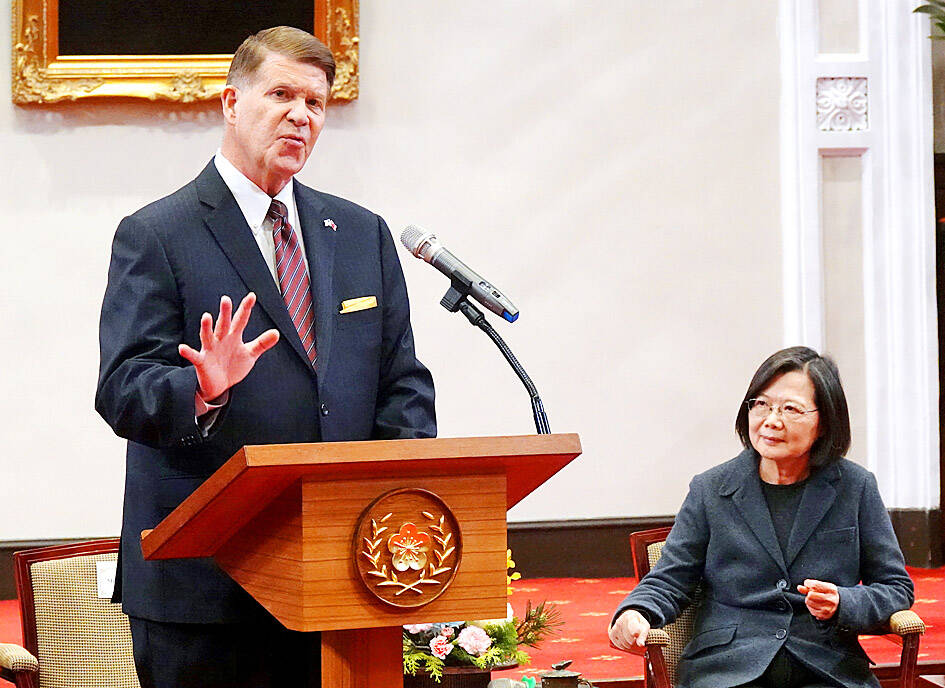Taiwan is working closely with the US to resolve the issue of double taxation in the hope of deepening bilateral partnerships in key supply chains, President Tsai Ing-wen (蔡英文) told a US-Taiwan Business Council delegation yesterday.
Led by former US undersecretary of state for economic growth, energy and the environment Keith Krach, the delegation consists of representatives from 29 US companies in fields such as energy, finance, defense and advanced technology.
Tsai thanked Krach for his efforts to promote cooperation and exchanges between Taiwan and the US, as well as the businesses for attaching great importance to the Taiwan market.

Photo: CNA
Taiwan has demonstrated resilience in the past few years amid an uncertain global economic environment due to the COVID-19 pandemic and the geopolitical landscape, maintaining its international competitiveness and contributing to the stability of the global supply chain, she said.
As the eighth-largest trading partner of the US, Taiwan is seeking solutions to the double taxation issue to build a better investment environment for both sides and deepen partnerships in key supply chains, she said.
The US House of Representatives Committee on Ways and Means on Friday approved the Tax Relief for American Families and Workers Act of 2024, which includes removing the current double taxation between the US and Taiwan, which Tsai said is welcome progress.
She also expressed Taiwan’s willingness to join the Washington-led Indo-Pacific Economic Framework, while soliciting support from the council.
Krach congratulated president-elect William Lai (賴清德) and vice president-elect Hsiao Bi-khim (蕭美琴) and praised Taiwanese as they “stood resolutely behind their democracy and sent a clear message to the rest of the world that their freedom is here to stay” through the presidential and legislative elections on Jan. 13.
The results of the elections also indicated public support for Taiwan to maintain its ties with the US, he said.
“The momentum between the US and Taiwan will keep growing and our friendship will soar to new heights,” he added.
The delegation is to discuss topics of mutual interest with Taiwanese counterparts, including trade policies, investment opportunities and technological cooperation with the goal of driving economic growth and innovation for both the US and Taiwan, he said.
Now chairman of the Krach Institute for Tech Diplomacy at Purdue, Krach said that the institute launched the Taiwan Center for Innovation and Prosperity to partner with Taiwan’s leading companies and innovators to “provide access to world-class talent, a rich investment ecosystem and raise Taiwan’s international standing.”
There is bipartisan consensus in Washington that Taiwan’s freedom and prosperity are “in the economic, technological, scientific and national security interests of the US and the free world,” he said.
On Monday, the delegation met with Premier Chen Chien-jen (陳建仁), who thanked the council for its long-term efforts to promote economic and trade relations between Taiwan and the US, such as by communicating with the US government, holding industry forums, publishing survey reports and visiting the nation regularly.
The two sides are to continue bolstering ties through the Economic Prosperity Partnership Dialogue and the Technology Trade and Investment Collaboration, he said.

A preclearance service to facilitate entry for people traveling to select airports in Japan would be available from Thursday next week to Feb. 25 at Taiwan Taoyuan International Airport, Taoyuan International Airport Corp (TIAC) said on Tuesday. The service was first made available to Taiwanese travelers throughout the winter vacation of 2024 and during the Lunar New Year holiday. In addition to flights to the Japanese cities of Hakodate, Asahikawa, Akita, Sendai, Niigata, Okayama, Takamatsu, Kumamoto and Kagoshima, the service would be available to travelers to Kobe and Oita. The service can be accessed by passengers of 15 flight routes operated by

MORE FALL: An investigation into one of Xi’s key cronies, part of a broader ‘anti-corruption’ drive, indicates that he might have a deep distrust in the military, an expert said China’s latest military purge underscores systemic risks in its shift from collective leadership to sole rule under Chinese President Xi Jinping (習近平), and could disrupt its chain of command and military capabilities, a national security official said yesterday. If decisionmaking within the Chinese Communist Party has become “irrational” under one-man rule, the Taiwan Strait and the regional situation must be approached with extreme caution, given unforeseen risks, they added. The anonymous official made the remarks as China’s Central Military Commission Vice Chairman Zhang Youxia (張又俠) and Joint Staff Department Chief of Staff Liu Zhenli (劉振立) were reportedly being investigated for suspected “serious

ENHANCING EFFICIENCY: The apron can accommodate 16 airplanes overnight at Taoyuan airport while work on the third runway continues, the transport minister said A new temporary overnight parking apron at Taiwan Taoyuan International Airport is to start operating on Friday next week to boost operational efficiency while the third runway is being constructed, the Ministry of Transportation and Communications said yesterday. The apron — one of the crucial projects in the construction of the third runway — can accommodate 16 aircraft overnight at the nation’s largest international airport, Minister of Transportation and Communications Chen Shih-kai (陳世凱) told reporters while inspecting the new facility yesterday morning. Aside from providing the airport operator with greater flexibility in aircraft parking during the third runway construction,

Taiwanese and US defense groups are collaborating to introduce deployable, semi-autonomous manufacturing systems for drones and components in a boost to the nation’s supply chain resilience. Taiwan’s G-Tech Optroelectronics Corp subsidiary GTOC and the US’ Aerkomm Inc on Friday announced an agreement with fellow US-based Firestorm Lab to adopt the latter’s xCell, a technology featuring 3D printers fitted in 6.1m container units. The systems enable aerial platforms and parts to be produced in high volumes from dispersed nodes capable of rapid redeployment, to minimize the risk of enemy strikes and to meet field requirements, they said. Firestorm chief technology officer Ian Muceus said